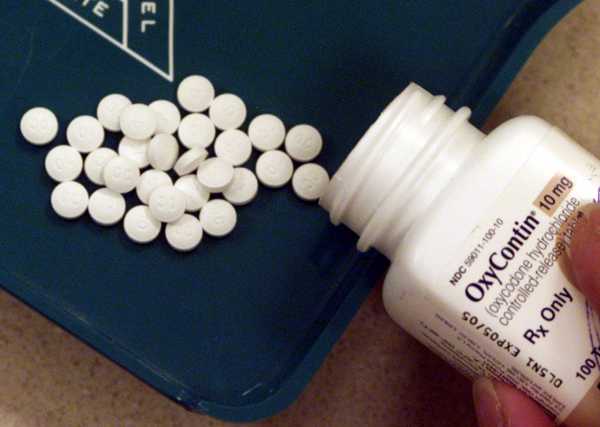
New data from the Blue Cross Blue Shield Association suggests opioid addiction rates are finally plateauing. But that doesn’t necessarily mean overdose deaths will drop anytime soon. It’s a sobering reminder of just how long it might take America to get through the ongoing crisis.
The big finding from the BCBSA data, which compiles medical claims information from the various Blue Cross affiliates across the United States: Diagnoses of opioid use disorder (addiction, in other words) declined from 2016 to 2017, from 6.2 per 1,000 patients to 5.9.
It was the first decline BCBSA had measured in eight years, since it started tracking opioid use disorder diagnoses. It also comports with other national data sets we’ve seen recently.
”The data from BCBS is certainly good news and promising,” Eleanor Artigiani, the deputy director for policy at the University of Maryland’s Center for Substance Abuse Research, told me.
The Blue Cross data indicated that efforts to curb overprescribing are having the desired effect: Opioid prescriptions have dropped by nearly 30 percent from 2013 to 2017. Two-thirds of opioid prescriptions filled in 2017 were within the Centers for Disease Control and Prevention’s recommended guidelines.
”It means that there’s light at the end of the tunnel,” Andrew Kolodny, co-director of the Opioid Policy Research Collaborative at Brandeis University, told me. “The decrease in new cases of opioid addiction is likely due to the trend in more cautious prescribing and greater public awareness of opioid risks.”
But this data doesn’t mean the opioid crisis is winding down just yet. Overdose deaths reached new highs in 2016, when more than 60,000 people died of drug overdoses, most of them from opioids.
Millions of Americans are still living with opioid addiction. More powerful synthetic opioids like fentanyl have made the risks of just one relapse even deadlier.
”The genie is out of the bottle,” Kolodny said. “Unless we do a better job of increasing access to effective treatment, overdose deaths will remain at record-high levels and we’ll have to wait for this generation to die off before the crisis comes to an end.”
Congress is looking at some new steps to improve access to addiction recovery, such as allowing doctors to prescribe medication-assisted treatments to more patients, but lawmakers have yet to make the kind of financial investment experts think is necessary to fight the crisis.
So the BCBSA data is good news, with ample caveats. We do seem to be getting better at preventing overprescribing, and addiction rates do seem to be stagnating. Nevertheless, we need to do a lot more if we are to stop setting new records every year for overdose deaths.
Maureen Boyle, a former researcher at the National Institute on Drug Abuse who nows work at the Addiction Policy Forum, summed up these contradictions like this:
This story appears in VoxCare, a newsletter from Vox on the latest twists and turns in America’s health care debate. Sign up to get VoxCare in your inbox along with more health care stats and news.
vox-mark
VoxCare
Subscribe
By signing up, you agree to our Privacy Policy and European users agree to the data transfer policy.
For more newsletters, check out our newsletters page.
Join the conversation
Are you interested in more discussions around health care policy? Join our Facebook community for conversation and updates.
Sourse: vox.com






